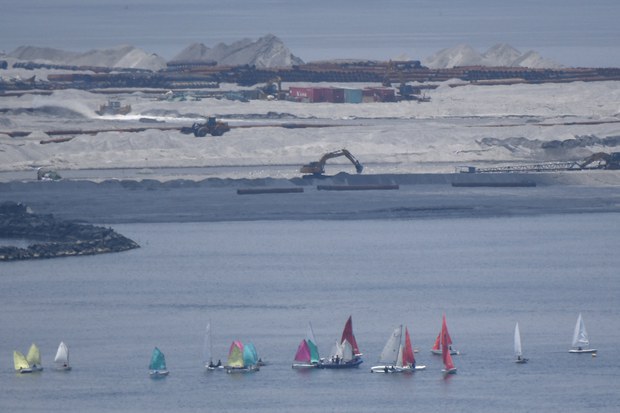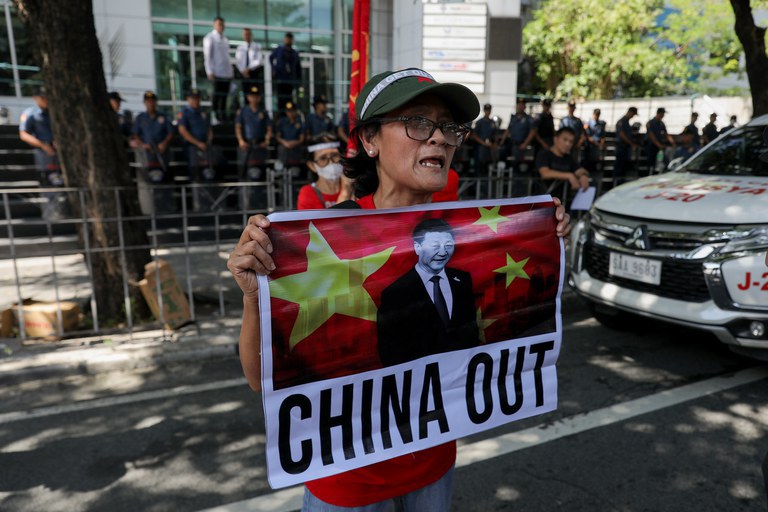Environmentalists praise suspension of Chinese reclamation projects in Manila Bay
Share

Boats sail past a reclamation project in Manila Bay, Philippines, Aug. 10, 2023.
Green groups in the Philippines are welcoming the government’s decision this week to suspend nearly two dozen Chinese-backed reclamation projects in Manila Bay until it completes a review on the environmental impact.
The temporary halt will allow regulators to review each project approved under former President Rodrigo Duterte, the Marcos administration said after the American embassy had expressed concern last week over the role of a -blacklisted Chinese company in the projects and their potential environmental impact.
Maria Antonio Yulo-Loyzaga, the environment secretary, announced the projects’ suspension Thursday, saying that “all are under review” for a “cumulative impact assessment” on the environment. She did not give a specific timeline for the reviews, but said her office would determine compliance including whether the projects had environmental clearance certificates.
“We welcome this [cumulative impact assessment], as it is a long-overdue step in the complete appraisal of the impacts of reclamation across the critical bay ecosystem,” said the People’s Network for the Integrity of Coastal Habitats and Ecosystems (People’s NICHE), which along with another organization representing some 20 local environmental advocacy groups, applauded the action.
“We also hope it serves as a precedent for similar approaches in other parts of the country where reclamation projects are also concentrated, such as in Metro Cebu,” People’s NICHE said in a letter to the environment department, referring to a highly urbanized city in the central Philippines.
The suspension comes amid increasing tensions between the Philippines and China over a territorial dispute in the South China Sea, although the government of President Ferdinand Marcos Jr. has tried to balance friendly ties with both China and Beijing’s geopolitical rival, the United States.
A China Coast Guard ship last weekend fired water cannon at a Philippine Coast Guard ship escorting a civilian convoy that was delivering supplies to a Filipino marine outpost in Ayungin Shoal (Second Thomas Shoal). Since then, the two sides have exchanged angry messages, and the Philippines said it was close to launching joint patrols with the U.S. in contested waters as well as deploying its own maritime militia there.
On Aug. 2, the U.S. Embassy had noted the reclamation projects’ link to the state-run China Communications Construction Co. Ltd. (CCCC), saying the U.S. Department of Commerce had added the firm to its Entity List for helping the Chinese military construct and militarize artificial islands in the disputed South China Sea. The U.S. Treasury Department’s Office of Foreign Assets Control had also included CCCC on its sanctions list.


People’s NICHE warned that some big-ticket projects could be cleared on technicalities during the review. It said one airport project that encroaches on Manila Bay farther north has been identified as a “land development project.”
“We believe that all infrastructure projects in the Manila Bay area should be included in the impact assessment because doing otherwise will only give us an impoverished understanding of the scale and scope of their environmental impacts,” it said.
The group also called on the government to include social scientists on its review team because of concerns that projects would displace large communities.
Yulo-Loyzaga said a scientific team would be organized within the month to carry out the study. While announcing that the 22 projects approved during the Duterte administration (2016-22) had been suspended, she did not provide a specific list.
“We have to take our time, really, beginning with those that are ongoing, because they are, in fact, already impacting the areas. And then, we will graduate to those that are in fact, still not yet begun,” the secretary said.
Endangered clams
On Friday, the Tanggol Kalikasan (Protect the Environment) group said it supported growing calls by legislators and other nationalist groups to ban CCCC from operating in the Philippines.
“[C]hinese companies are involved in major projects in the Philippines such as the Manila Bay Reclamation Project that have adverse impacts on the environment and biodiversity,” Tanggol Kalikasan said.
The presence of Chinese maritime militia boats in contested waters had led to the destruction of vital coral reefs, the group alleged.
“Poaching of endangered giant clams has also become prevalent,” the group said.
On Friday, Senate President Juan Miguel Zubiri, a Marcos ally, said taxpayers were unwittingly funding China’s illegal activities in the South China Sea because of the “continued patronage of Chinese contractors.”
He called on the Marcos government to cut ties with the Chinese contractors.
“The public works department has projects with companies that are state-owned by China, which has not stopped bullying our fishermen,” Zubiri said in a local radio interview.
“Then let’s retaliate and blacklist these companies. Why should Filipino taxpayers pay these state-owned firms, whose income would go back to China, which will then use it to pay for their navy and coast guard who will harass us,” he said. “That is not right.”
He said the government should look at awarding big-ticket projects to “friendlier” countries such as Japan or South Korea.
“Let’s just give them to our neighbors who love us, who are our friends, those who are helping us,” he said, as he hit out at China for being “two-faced” by publicly declaring its friendship yet doing things to undermine the Philippines.
Basilio Sepe, Jojo Riñoza and Noel Celis in Manila contributed to this report by BenarNews, an RFA-affiliated online news organization.







